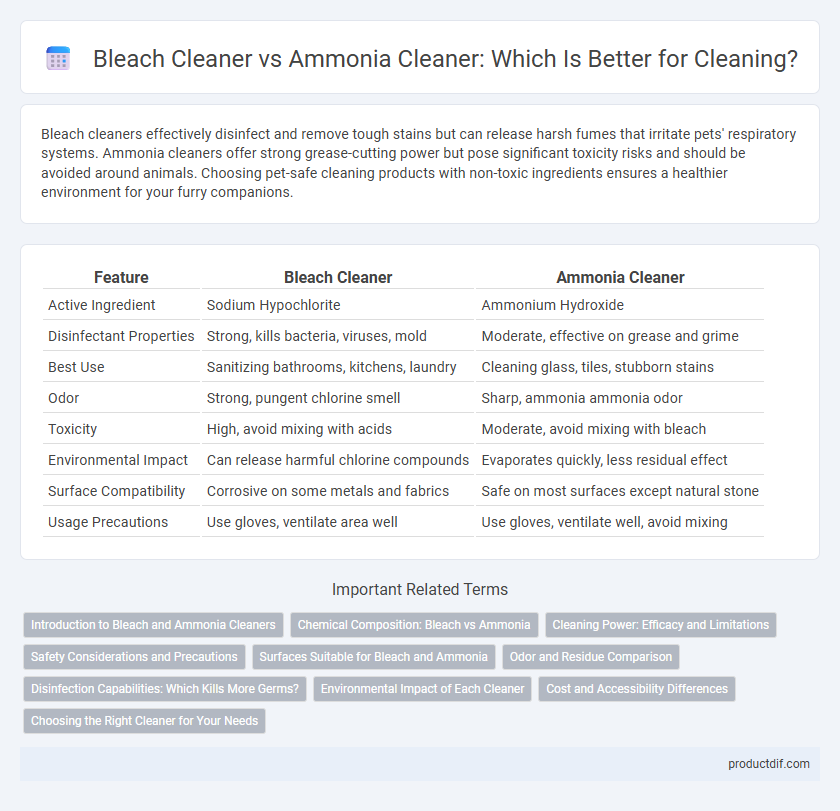Bleach cleaners effectively disinfect and remove tough stains but can release harsh fumes that irritate pets' respiratory systems. Ammonia cleaners offer strong grease-cutting power but pose significant toxicity risks and should be avoided around animals. Choosing pet-safe cleaning products with non-toxic ingredients ensures a healthier environment for your furry companions.
Table of Comparison
| Feature | Bleach Cleaner | Ammonia Cleaner |
|---|---|---|
| Active Ingredient | Sodium Hypochlorite | Ammonium Hydroxide |
| Disinfectant Properties | Strong, kills bacteria, viruses, mold | Moderate, effective on grease and grime |
| Best Use | Sanitizing bathrooms, kitchens, laundry | Cleaning glass, tiles, stubborn stains |
| Odor | Strong, pungent chlorine smell | Sharp, ammonia ammonia odor |
| Toxicity | High, avoid mixing with acids | Moderate, avoid mixing with bleach |
| Environmental Impact | Can release harmful chlorine compounds | Evaporates quickly, less residual effect |
| Surface Compatibility | Corrosive on some metals and fabrics | Safe on most surfaces except natural stone |
| Usage Precautions | Use gloves, ventilate area well | Use gloves, ventilate well, avoid mixing |
Introduction to Bleach and Ammonia Cleaners
Bleach cleaners contain sodium hypochlorite, a powerful oxidizing agent effective in disinfecting surfaces, removing stains, and whitening fabrics. Ammonia cleaners, based on ammonium hydroxide, excel at cutting through grease, grime, and organic residues on windows, countertops, and tiles. Both chemicals serve distinct cleaning purposes but must never be mixed due to the toxic chloramine gas that forms.
Chemical Composition: Bleach vs Ammonia
Bleach cleaner primarily contains sodium hypochlorite, a powerful oxidizing agent effective against bacteria, viruses, and mold, while ammonia cleaner is composed of ammonium hydroxide, which excels at cutting through grease and grime. Sodium hypochlorite's strong disinfectant properties make bleach ideal for sanitizing surfaces but can cause discoloration on fabrics and surfaces. Ammonia's high pH makes it suitable for glass and tile cleaning, yet it must never be mixed with bleach due to the production of toxic chloramine vapors.
Cleaning Power: Efficacy and Limitations
Bleach cleaner offers powerful disinfection and stain removal, effectively killing bacteria, viruses, and mold on surfaces. Ammonia cleaner excels at cutting through grease and grime, providing a streak-free shine on glass and hard surfaces but lacks strong antibacterial properties. Both have limitations: bleach can produce harmful fumes and damage certain materials, while ammonia's effectiveness diminishes on porous surfaces and cannot disinfect as thoroughly as bleach.
Safety Considerations and Precautions
Bleach cleaner contains sodium hypochlorite, which can release toxic chlorine gas when mixed with ammonia, posing severe respiratory hazards. Ammonia cleaner emits strong fumes that can irritate the eyes, skin, and respiratory tract, requiring use in well-ventilated areas and protective gloves. Both products demand careful storage and labeling to prevent accidental mixing and ensure safe household or industrial cleaning applications.
Surfaces Suitable for Bleach and Ammonia
Bleach cleaner is highly effective on non-porous surfaces such as tile, porcelain, and glass, making it ideal for disinfecting bathroom fixtures, kitchen counters, and mold-prone areas. Ammonia cleaner works well on greasy surfaces like stovetops, ovens, and windows, providing streak-free shine on glass and metal without causing damage. Both products should be used on appropriate surfaces to prevent damage: avoid bleach on wood or metal and ammonia on natural stone or painted surfaces.
Odor and Residue Comparison
Bleach cleaner emits a strong, pungent odor that can cause respiratory irritation, while ammonia cleaner produces a sharp, penetrating smell that can also be overwhelming in confined spaces. Bleach often leaves a slight residue that may cause surface discoloration or damage if not rinsed properly, whereas ammonia cleaner typically evaporates quickly with minimal residue but can leave a slippery film on surfaces. Both cleaners require adequate ventilation to minimize odor impact and prevent harmful chemical reactions when combined.
Disinfection Capabilities: Which Kills More Germs?
Bleach cleaner contains sodium hypochlorite, which effectively kills a broad spectrum of bacteria, viruses, and fungi, making it highly potent for disinfection. Ammonia cleaner primarily targets grease and grime but offers limited germ-killing properties and is less effective against viruses and certain bacteria. For thorough sanitization and germ elimination on hard surfaces, bleach cleaner provides superior disinfection capabilities compared to ammonia cleaner.
Environmental Impact of Each Cleaner
Bleach cleaners release chlorine-based compounds that can produce harmful byproducts such as dioxins and contribute to water pollution, negatively affecting aquatic ecosystems. Ammonia cleaners emit nitrogen compounds that can cause air pollution and contribute to the formation of smog, impacting respiratory health and atmospheric quality. Both cleaners require careful usage and disposal to minimize their environmental footprints and toxicity to wildlife.
Cost and Accessibility Differences
Bleach cleaners generally cost more than ammonia cleaners due to their stronger disinfecting properties and wider variety of formulations. Ammonia cleaners are more affordable and readily available in many grocery and hardware stores, making them accessible for everyday use. However, bleach may require careful handling and ventilation, which can affect overall usage and cost considerations.
Choosing the Right Cleaner for Your Needs
Bleach cleaner excels at disinfecting surfaces and removing tough stains with potent antibacterial properties, making it ideal for kitchens and bathrooms. Ammonia cleaner provides powerful grease-cutting abilities and leaves glass surfaces streak-free, perfect for windows and stovetops. Selecting the right cleaner depends on the specific cleaning task, surface type, and safety considerations, as mixing bleach and ammonia creates hazardous fumes.
Bleach cleaner vs Ammonia cleaner Infographic

 productdif.com
productdif.com